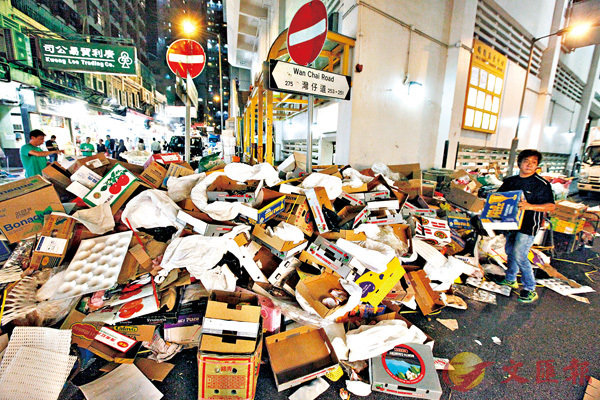 ■廢紙回收商罷市期間,有些街市旁邊廢紙堆積如山。 資料圖片
■廢紙回收商罷市期間,有些街市旁邊廢紙堆積如山。 資料圖片【原文】本港回收出口商會上個月16日至18日暫停回收廢紙,令社會一時出現「廢紙危機」。是次危機暴露出本港回收業(recycling industry)的「軟肋」,長期以來只是充當低技術的「垃圾中轉站」(garbage hub),業界缺乏升級為環保回收產業的主動積極作為。政府和業界應將此次危機視為促進(promote)行業升級轉型的機遇,由政府制定長遠的產業政策,給予適當的支援和引導;業界更應與時俱進提升行業技術水平,改善裝備,讓香港的回收業向具競爭力的方向發展。
內地一早提高回收門檻
本港回收的廢紙九成輸往內地(mainland China)。隨着內地經濟發展和對環保的要求越來越高,已經不願做其他地區的垃圾收集站,對廢品進口(waste imports)的要求日益提高。
今年7月,國務院( State Council)頒令由年底起內地不再接收廢塑膠、未經分類廢紙等24 種固體廢棄物。本港回收商要將廢物賣給內地,就需要經過預先處理,但本港業界對此重視不足,毫無準備(unprepared),導致手忙腳亂。
早在2013年,內地實施「綠籬行動」(Operation Green Fence),已要求膠樽一定要破碎才能進口,已經發出提高回收門檻(raised threshold)的明確信息。有關部門和業界本應及早採取應對措施,滿足更嚴格的回收要求。
今年7月國務院頒令之後,特區政府部門仍然有時間(ample time)去溝通和採取措施應對。
然而,現實所見,商會上月宣佈將暫停回收之後,才引起輿論關注,環保署等部門才制定臨時應對措施(temporary measures)。
追上國際標準 政府可補貼發展
這次危機反映本地回收業技術落後(primitive at best),僅僅停留在打包出口的階段。世界各地都在積極發展環保再造業,但所需的廢料是經過分揀處理的有用廢物,不是什麼都混雜一起的垃圾。本港回收的廢物只是堆放在回收場而很少進行初級處理,不僅附加值低(little added value),而且容易造成污染(pollution)和存在消防隱患(fire hazard)。
早前一個塑膠回收場發生三級火,已敲響警鐘。本港回收業要生存下去,就必須提升回收物料質素,追上國際標準(international standards)。
要促進本地回收業升級轉型,政府扮演重要角色。回收業與社會民生( livelihood issues)高度相關,不少國家和地區例如韓國和台灣都有補貼回收業。
長遠而言,政府應該借鑒其他地區的成功經驗,加強對回收再造業提供技術培訓(technical training)、資源補貼或設備資助等,助推本港回收業界邁上新台階。 (標題及小標題為編輯所加) (摘錄自香港文匯報社評16-9-2017)
Scrap paper crisis urges upgrade of recycling industry
【譯文】A "scrap paper crisis" hits Hong Kong briefly as the city's recycling business association suspended waste paper recycling from 16-18 September. This temporary crisis has exposed the local recycling industry's major weaknesses: it only acts as a low-tech garbage hub, and it lacks the initiative to upgrade operations.
To steer Hong Kong's recycling industry in the right direction and regain competitiveness, both the government and the sector should see the crisis as an opportunity to promote upgrading and restructuring. The government should formulate long-term plans and provide necessary support, whereas the industry should upgrade its skills and equipment.
Mainland has long upgraded threshold
90 per cent of Hong Kong's recycled scrap paper is exported to mainland China. Due to economic development and a higher emphasis on environmental protection, China has become more reluctant to import garbage from other regions, and requirements on waste imports have been tightened.
July this year, the State Council announced it would ban 24 types of imported waste including waste plastics and unsorted scrap papers by the end of 2017. By then, all waste exports to mainland China have to be processed by local recyclers first.
However, the local recycling industry did not pay enough attention, and was totally unprepared for the change.
As early as 2013, when China banned unshredded plastic bottle imports after Operation Green Fence first kicked off, it already sent a clear message regarding the raised threshold for waste imports. The authorities and the sector should have swiftly responded to the change in order to meet the tightened import management regime. There was still ample time for the authorities to communicate and take action even after the State Council's announcements in July.
Yet evidently, it was only after the association suspended collection that aroused public concern, which then prompted the Environmental Protection Department to devise temporary measures.
Government can subsidise
The crisis has exposed the fact that our recycling system is primitive at best, and can barely do anything than to pack and ship. Environmental and recycling industries are thriving around the globe, however it is the sorted recyclable refuse that fuel their development, not piles of mixed and unprocessed garbage. Piled up in recycling plants and often lacked primary treatment, recycled wastes in Hong Kong not only provide little added value, but are also a source of pollution and fire hazard.
The third-alarm fire that broke out in a local recycling plant earlier has already rung the alert. If the local recycling industry were to survive, the quality of their products must catch up with international standards.
As a facilitator of the local recycling industry's upgrading and restructuring, the government's role is very important. Recycling industry is highly related with livelihood issues, therefore governments of many countries and regions, such as South Korea and Taiwan, would directly subsidise the sector.
To drive the local recycling sector forwards, the Hong Kong government in the long run should learn from their experience, strengthen the provision of technical training, and provide subsidies to the recycling industry.■Jeffrey Tse [ywc_jeffrey@hotmail.com]
Exercise
1. 製漿(廢紙)
2. 製粒(廢膠)
3. 污染者自付
4. 廢電器電子產品
5. 非法傾倒廢物
Answers
1. pulping
2. pelletizing
3. polluter pays
4. waste electrical and electronic equipment (WEEE)
5. fly-tipping

